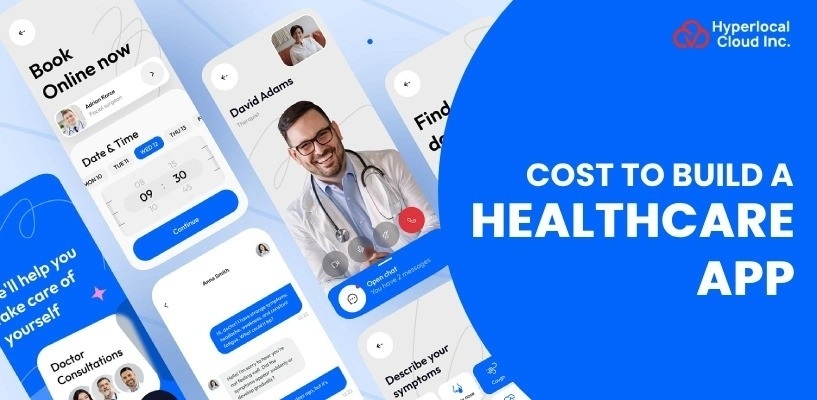How Much Does It Cost To Build A Healthcare App

With the rapid technological advancements, the healthcare industry is truly revolutionizing through groundbreaking innovations. All this is possible due to the seamless integration of ultra-modern technologies that help enhance patient care. From 2024-2030, the market size of mhealth apps is predicted to grow at a CAGR of 14.9% and by 2030 is estimated to reach 86.37bn. These numbers show how the popularity of online healthcare apps is surging. Due to this, entrepreneurs across the globe are convinced to invest in an online healthcare app.
The cost to build a healthcare app starts at $7k, depending on numerous factors. In this blog, you’ll learn about the intricacies involved in the development process and how these impact the overall budget.
Get An Exact Quote On Healthcare App Development Cost!
Top Parameters Influencing The Cost Of Healthcare App
Development Process
The more prominent part of deciding the budget depends upon the stages involved, i.e., research, planning, designing, coding, testing, launch, and maintenance. The workforce required for the entire journey must be massive because of the distinct domains involved. The cost tends to vary based on the complexities and the developers’ salary.
Type Of Platform
There are three major categories of mobile apps, all varying significantly.
For native apps, an impressive user experience, responsiveness, and efficiency are required. Most importantly, the application must be designed for both Android and iOS.The development charges are higher as the app is subjected to customization because of the different platforms and the different programming languages- as no same code is required.
Web Apps are accessed through web browsers and can be used on any device, such as a mobile or PC. They have a much faster development time than native apps, are simple to maintain, and require lower development costs.
Hybrid apps are built for multiple platforms using various frameworks. They are basically a combination of native and web apps. These are simple to maintain, have lesser replication costs, and have lower development charges.
Feature Integration
The attributes play a pivotal role in the development charges. Healthcare care revolves around splendid features, and each one of them costs differently. Here we have mentioned some of them below;
Reminders: Helps remind patients about their medicine doses, nutrition diets, appointments, etc.
EHR Feature: Enables hospitals to manage massive amounts of patient data and maintain healthcare records over the app.
In-Appchat: The AI-powered chatbots help patients clarify health related issues. It also allows smooth communication between doctors and patients while discussing their health status at any time.
Payment Integration: This feature makes seamless payment transfers possible by integrating payment gateways like Braintree, Paypal, Stripe, etc.
Technology Stacks
Tech stacks act as the backbone of any platform and are extremely crucial for healthcare app development costs. Frameworks, databases, access to libraries, cloud infrastructure, backend architecture, and frontend elements- interface, UI/UX design, logo, graphics, etc. —are all software-related things that are complex and require huge financial investments.
API Integration
These are a set of protocols that are helpful in connecting the devices/apps for data exchange and seamless communication.
There are different factors involved in the API integration cost;
- No. Of Endpoints
- Data Volume
- Security Requirements
- Integration Type
- No.Of Features
App Complexity
The healthcare app development cost is influenced by the app’s complexity. Categorically speaking, there are three ways to represent app design: basic, medium, and advanced. The basic app does not require much emphasis; the medium one requires slightly more, whereas the complex ones require a greater focus on the style, layout, font colors, graphics etc.
Company’s Size
The size does impact the budget, as a bigger company has more employees than a medium-sized startup. Whatever the project’s requirement, the client can connect with the desired company.
Geographical Location
The company’s location is very important, as they charge accordingly. The developers in the USA charge considerably higher than the ones in the UK, Europe, and Asian countries.
Compliance And Regulation
While developing healthcare apps, they must comply with healthcare compliance and regulation requirements, including adhering to HIPPA, FDA, GDPR, etc.
Are you planning to develop a healthcare app? If yes, then collaborate with us. With our unique healthcare app development services, we have effectively served various clients worldwide.
Types Of Apps in the Healthcare Industry
Telemedicine Apps
Offers real-time video consultations, enhances accessibility, offers secure messaging, appointment scheduling, prescription management, remote monitoring
mHealth Apps/Fitness apps
Provides nutrition monitoring, medication reminders, wearable integration, telehealth integration, health analytics, fitness tracking, etc.
Appointment Scheduling Apps
Streamlines the process of booking, canceling and rescheduling appointments to improve the patient’s experience. It involves calendar integration, appointment history, push notifications, real-time availability, etc.
E-Prescription Apps
Completely digitizes the prescription process involving secure data transmission, patient access, pharmacy communication, medication history integration and integration with EHR systems:
Patient Engagement Apps
It offers health education content, appointment reminders, medication adherence tracking, and integrated wearables data that promote patients’ healthcare-related journeys.
Chronic Disease Management Apps
Helps patients manage their health conditions, track symptoms, handle medication personalized care plans, integrate health monitoring devices, and facilitate smooth communication with healthcare providers.
EHR/EMR Integration
These help digitize patient records while storing the patient’s demographics, including medical history and treatments. They also facilitate clinical notes and medical management integration with laboratories, all to foster medical safety.
Remote Monitoring Apps
Helps track the patient’s health metrics and look for active signs in absolute real time. Moreover, the healthcare data is presented comprehensively, with instant alerts sent to healthcare providers in case of critical events.
Estimate A Proper Budget For Your Healthcare App!
Benefits Of Healthcare App Development
The million-dollar question is why businesses would want to invest in building a healthcare app. To answer that, we have curated the following list that showcases the perks as under;
Enhanced Patient Care
The healthcare app offers stupendous healthcare services like conducting appointments, access to medical records, fetching reminders, and showing follow-up appointments.
Access To Superior Services
The availability of the services, be it rural, urban or remote areas, anytime, anywhere, gives rise to better healthcare access that adds as a plus point. This unlimited mobility solves the problem of not standing in longer queues for a doctor’s visit.
Increased revenue
The top-tier revenue model surrounding the healthcare app boosts profit and increases the revenue to the optimum level. The monetization opportunities include in-app ads, subscription fees, content monetization, mhealth app licensing, sponsors etc.
Improved efficiency
All the operations are automated and streamlined, such as appointment scheduling, canceling, billing, patient communication, claims processing & management, analytics, onboarding, personalized medication, access to medical history and health records, etc.
Bottom Line!!
Developing a healthcare app is a daunting task, requiring extensive effort. If you are interested in developing one, contact our experts and build the kind of app you want. Depending on the project, our team will create a budget that suits your needs.
FAQs
How much would it cost to develop a healthcare mobile app?
The cost ranges from $10k to $45k, depending on factors such as customization, complexity, design, third-party APIs, etc.
How much time will it take to develop a healthcare mobile app?
It takes around 4-5 weeks to build the app, depending upon the project requirements.
What kind of process is involved in healthcare app development?
It starts with extensive market research, competitor analysis, roadmap creation, UI/UX design, development, quality assurance, deployment and maintenance.
Which tech stacks are used during the process?
Some popular tech stacks are Mongo DB, Kubernetes, React Native, AWS, Kotlin, and Swift.
What is the role of regulatory compliance in healthcare app development?
Adherence to GDPR and HIPAA ensures that the app data is perfectly secured, offers risk management, builds customer trust, enhances brand reputation, reduces costs, and, last but not least, automates.





